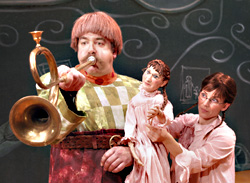Charles Leggett is only 6-foot-1. I find this surprising, as the Seattle actor always gives the impression of being much larger than that. It surprises him some, too. “I think I used to be taller,” he muses. “Maybe it’s only a fantasy that I used to be almost 6-foot-2. But when I was younger, I didn’t have my gut,” he says, gazing down fondly at his considerable midsection. “It drags me down a little. But it also gets me a lot of jobs.”
The job it most recently helped him get is the title role in the Seattle Children’s Theatre production of The BFG, Roald Dahl’s charming modern-day fairy tale about a Big Friendly Giant who makes friends with a little girl and has no appetite for “human beans.” It’s a splendid showcase for Leggett, despite his ludicrous costume and bright-red wig, allowing him to display his gift for language (smacking on words like “hippodumplings” and “crocodowndillies”) and his surprising gift for pathos. His director for The BFG, Rita Giomi, remembers the first time in rehearsal that they worked on the play’s ending, when he finally says goodbye to his friend. “He’s kissing a freaking puppet on the head, and we’re all weeping!” she remembers. “He’s got a very good sense of humor and a huge heart. He can just melt you. And he’s a damn good time in rehearsal.”
I’ve watched Leggett’s gut, and the actor himself, grow prodigiously in the past 12 years. Five years spent in the trenches of fringe theater, in shows good and bad (including a couple that I wrote and directed), in tiny semi-condemned buildings with no public rest rooms, playing a bewildering variety of comedies and dramas, new work and classics—Leggett was the actor everyone wanted to work with.
On the fringe scene, a world principally populated by twentysomethings a few years out of drama school, Leggett had “grown-up” appeal, and had been playing “aged fellers” since his high-school days (he’s now 42). He just looks like a powerful, mature man—Dad or the boss or a bullying military officer. For a big guy, Leggett is charmingly nimble on his feet. Regardless of the role, there was always something original about his interpretation—a witless husband in Machinal, a melancholy Prospero in Tempest, a malicious harmonica-playing Lord in a parody of It’s A Wonderful Life.
Oh yes—the harmonica. Leggett used to front a blues band and still occasionally sits in with other musicians, singing and playing his harp with great woofing gusts of air like he’s trying to shove himself through the tiny holes. Directors often sneak his harmonica-playing into roles, as David Esbjornsen did for Leggett’s show-swiping performance as Sir Toby Belch in the Rep’s recent Twelfe Night, where his drunken playing led him to momentarily mount a Christmas tree. Lately he’s had to cut back on his musicianship, due to his cohabitant, a moody Akita named Bella. “It causes my dog pain when I play, so I don’t practice as much as I’d like,” he says, and describes her habit of moving from room to room to escape the noise, pausing only to glare at him.
Leggett finally made the daunting leap from fringe to Equity professional back in 2000, and now makes a living (“a paltry one, but a living”) as a working actor at the Rep, ACT (including a five-year stint in A Christmas Carol as the Ghost of Christmas Present), SCT, Book-It, and Seattle Shakespeare Company, among other places. For someone who’s built up such a solid résumé playing a wide variety of roles, Leggett says that there’s one descriptor he can’t shake. “If you read a review of a show that I’m in, there’s at least a 60 percent chance that the word ‘blustery’ will be in there.” It’s true—he blusters very well. “He does blustery down to the soul,” says Giomi, and that can lead to him being typecast.
For me, the moments that make a Leggett performance are the quiet ones, where suddenly the bellowing laugh, the prodigious gut, and the crazed imagination pull back, revealing a touching vulnerability. His bewildered quiet joy in finding love in Twelfe Night effectively yanked the play away from the show’s protagonists, and hints at his other great passion: poetry. “Someone else might want to play Hamlet; I want to read and write poetry, and grow that way,” he says. “It takes a lot of pressure off from dealing with the actor’s profession.” Leggett’s poetry is far from slam fare; dense, quirky, and thoughtful, it’s fine on the page but is even better when he’s reading it, in that deep, sonorous, and unexpectedly tender voice.








